[This post will be updated regularly throughout the coming week (Tuesday 28th - Friday 1st) as we chronicle Pope Benedict XVI's apostolic journey. Please bookmark and pass along if interested. God bless! - Christopher]
- November 28, 2006 - Arrival; Visit to the Ataturk Mausoleum; Meeting with the Prime Minister Recep Tayyip Erdogan and Ali Bardakoglu, Chief of Turkey's Religious Affairs Directories;
- November 29, 2006 - Eucharistic celebration before the Shrine of Meryem Ana Eva in Ephesus; Moment of prayer at the Patriarchal Church of St. George and private meeting with H.H. Bartholomew I;
- November 30, 2006 - Divine Liturgy at the Patriarchal Church of St. George -- Feast of Saint Andrew the Apostle, Patron Saint of the Church of Constantinople; Visit to the Museum of Saint Sofia and the Grand Umayyad Mosque ["Blue Mosque"]; Moment of prayer in the Armenian Apostolic Cathedral and meeting with H.B. Patriarch Mesrob II
 Prayer of Protection for Pope Benedict XVI - Heavenly Father, from whom every family in heaven on earth takes its name, we humbly ask that you sustain inspire, and protect your servant, Pope Benedict XVI, as he goes on pilgrimage to Turkey — a land to which St. Paul brought the Gospel of your Son; a land where once the Mother of your Son, the Seat of Wisdom, dwelt; a land where faith in your Son’s true divinity was definitively professed. Bless our Holy Father, who comes as a messenger of truth and love to all people of faith and good will dwelling in this land so rich in history. In the power of the Holy Spirit, may this visit of the Holy Father bring about deeper ties of understanding, cooperation, and peace among Roman Catholics, the Orthodox, and those who profess Islam. May the prayers and events of these historic days greatly contribute both to greater accord among those who worship you, the living and true God, and also to peace in our world so often torn apart by war and sectarian violence
Prayer of Protection for Pope Benedict XVI - Heavenly Father, from whom every family in heaven on earth takes its name, we humbly ask that you sustain inspire, and protect your servant, Pope Benedict XVI, as he goes on pilgrimage to Turkey — a land to which St. Paul brought the Gospel of your Son; a land where once the Mother of your Son, the Seat of Wisdom, dwelt; a land where faith in your Son’s true divinity was definitively professed. Bless our Holy Father, who comes as a messenger of truth and love to all people of faith and good will dwelling in this land so rich in history. In the power of the Holy Spirit, may this visit of the Holy Father bring about deeper ties of understanding, cooperation, and peace among Roman Catholics, the Orthodox, and those who profess Islam. May the prayers and events of these historic days greatly contribute both to greater accord among those who worship you, the living and true God, and also to peace in our world so often torn apart by war and sectarian violence
We also ask, O Heavenly Father, that you watch over and protect Pope Benedict and entrust him to the loving care of Mary, under the title of Our Lady of Fatima, a title cherished both by Catholics and Muslims. Through her prayers and maternal love, may Pope Benedict be kept safe from all harm as he prays, bears witness to the Gospel, and invites all peoples to a dialogue of faith, reason, and love. We make our prayer through Christ, our Lord. Amen. (Prayer composed by Bishop William E. Lori)
Catholic / Orthodox Commentary
|
|
Background Articles (November 27th, 2006)
For an extensive roundup prior to 11/27/06, see Anticipating Pope Benedict's Papal Visit to Turkey - Supplementary articles, news and commentary. The Benedict Blog Nov. 24th-26th, 2006.
- "Talking Turkey" - Dr. Michael Liccione offers "an imaginary office-hours dialogue at a Catholic university between a student I shall call 'Alethia' and my professorial alter ego" on the many facets of Benedict's visit.
- Turkey’s Catholics, Orthodox pray for pope’s arrival, by Mavi Zambak. AsiaNews.it:
Ankara (AsiaNews) – Responding to the appeal of Benedict XVI, tonight all Catholic communities in Turkey will hold prayer vigils to accompany and welcome the pope throughout his trip to Turkey. Yesterday, after recital of the Angelus, the pontiff asked the faithful to accompany him in prayer so that “this pilgrimage may bear all the fruits that God desires” . . .
- Interview with Fr. Tom Michel on Benedict's Turkey visit w. John Allen, Jr. National Catholic Reporter Nov 27, 2006 07:25am.
- Benedict XVI's Journey to Turkey "Gesture of Love" Zenit News. Nov. 28, 2006 - Interview with Father Giovanni Cereti, Catholic theologian and lecturer of ecumenical theology:
The Church of Christ is a communion, and fraternal relations between Christians and churches are an essential expression of this communion, which already unites us to God in virtue of the common faith and one baptism.
After a long period during which, due to external difficulties, these visits could not be undertaken, the Second Vatican Council established a new starting point and the exchange of visits between local churches of the West and the East has become very frequent.
Among all these visits, most significant in fact are those carried out between the two most important sees of Christianity . . .
- Presentation of the Missal for Benedict XVI's Trip to Turkey - the Introduction to the missal that Benedict XVI will follow during his apostolic journey to Turkey (Tuesday - Friday). It was prepared by Archbishop Piero Marini, master of the liturgical celebrations of the Supreme Pontiff.
Fiumicino (Rome)
- 09.00 Departure from Leonardo Da Vinci International Airport of Rome/Fiumicino to Ankara
Ankara
(Capital of Turkey) [Wikipedia Guide]
- 13.00 - Arrival at Esembog(a International Airport
 Visit to the Atatürk Mausoleum:
Visit to the Atatürk Mausoleum:. . .the Pope travelled by car to the Mausoleum of Ataturk some 45 kilometers from the city. Built between 1944 and 1953, it holds the earthly remains of Mustafa Kemal "Ataturk" (Father of the Turks), founder and first president of the Turkish Republic (1923-1938). Within the building, which resembles a Greek temple and is reached by a flight of steps, the walls are covered in green marble and the ceiling decorated with gold mosaics. The cenotaph to Ataturk is made from a single block of marble weighing 40 tonnes. . . ." [Source: Kath.net]
And from Zenit News:Benedict XVI placed a floral wreath next to the monument and then signed the visitor's book and wrote in English: "In this land, a meeting point of different religions and cultures and a bridge between Asia and Europe, I gladly make my own the words of the founder of the Turkish Republic: 'Peace at Home, Peace in the World.'"
- Welcome ceremony and courtesy visit to the President of the Republic
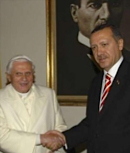 Meeting with the Prime Minister (Recep Tayyip Erdogan). From BBC News' profile of the VP (Turkey's charismatic pro-Islamic leader Nov. 4 2002):
Meeting with the Prime Minister (Recep Tayyip Erdogan). From BBC News' profile of the VP (Turkey's charismatic pro-Islamic leader Nov. 4 2002):His background and commitment to Islamic values also appeal to most of the devout Muslim Turks who have been alienated by the state.
But his pro-Islamist sympathies earned him a conviction in 1998 for inciting religious hatred.
He had publicly read an Islamic poem including the lines: "The mosques are our barracks, the domes our helmets, the minarets our bayonets and the faithful our soldiers..."
He was sentenced to 10 months in jail, but was freed after four. [...]
Mr Erdogan has disavowed the hardline Islamic views of his past and is trying to recast himself as a pro-Western conservative. He does not insist on leaving Turkey's Nato and says the country's membership of the European Union is a necessary and useful step.
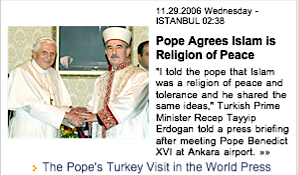 Turkish online newspaper Zaman later milked the meeting for all its worth:
Turkish online newspaper Zaman later milked the meeting for all its worth:"I told the pope that Islam was a religion of peace and tolerance and he shared the same ideas," Turkish Prime Minister Recep Tayyip Erdogan told a press briefing after meeting Pope Benedict XVI at Ankara airport. . . .
[NOTE: Zaman's lead story features a photo of the Holy Father's meeting with Ali Bardakoglu].Saying that the government did its best to welcome the pontiff in a hospitable manner, Erdogan expressed his wishes that the visit would be fruitful for world peace. Asked about the pope's attitude on Turkey's EU membership, Erdogan replied: "I said that I expected his support on membership and the pope responded, ’We are not politicians but would like Turkey to join the EU.’"
- Benedict XVI's address to Ali Bardakoglu, Chief of Turkey's Religious Affairs Directories - The meeting was attended by representatives of the Muslim community, among whom were the grand muftis of Ankara and Istanbul, as well as cardinals and bishops who are part of the papal entourage. [Zenit News 11/28/06]:
I have set out upon my visit to Turkey with the same sentiments as those expressed by my predecessor Blessed John XXIII, when he came here as Archbishop Giuseppe Roncalli, to fulfill the office of Papal Representative in Istanbul: "I am fond of the Turks, to whom the Lord has sent me … I love the Turks, I appreciate the natural qualities of these people who have their own place reserved in the march of civilization" (Journal of a Soul, pp. 228, 233-4).
For my own part, I also wish to highlight the qualities of the Turkish population. Here I make my own the words of my immediate predecessor, Pope John Paul II of blessed memory, who said on the occasion of his visit in 1979: "I wonder if it is not urgent, precisely today when Christians and Muslims have entered a new period of history, to recognize and develop the spiritual bonds that unite us, in order to preserve and promote together, for the benefit of all men, 'peace, liberty, social justice and moral values'" (Address to the Catholic Community in Ankara, 28 November 1979). . . .
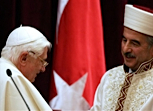 Pope urges leaders to renounce violence, by Victor L. Simpson (Associated Press 11/28/06)
Pope urges leaders to renounce violence, by Victor L. Simpson (Associated Press 11/28/06)Seeking to ease anger over his perceived criticism of Islam, Benedict met with Ali Bardakoglu, who heads religious affairs in Turkey, warmly grasping hands. Benedict sat nearby as the Muslim cleric defended his religion.
"The so-called conviction that the sword is used to expand Islam in the world and growing Islamophobia hurts all Muslims," Bardakoglu said.
The comment appeared to be a reference to Benedict's remarks in a speech in September when he quoted a 14th-century Christian emperor who characterized the Prophet Muhammad's teachings as "evil and inhuman, such as his command to spread by thy sword the faith he preached."
The Vatican described the cleric's speech as "positive, respectful and non-polemical," applauding what the church sees as efforts for a true dialogue between faiths.
- Meeting with the Diplomatic Corps - Pope Benedict XVI's Address of the Holy Father with the Diplomatic Corps of Ankara - Apostolic Nunciature of Ankara. Tuesday, 28 November 2006.
Coverage / Commentary
- Speaking to the journalists accompanying him on his flight, the Pope affirmed that his visit to Turkey "is not political but pastoral", and that its aim is "dialogue and the shared commitment to peace." Vatican Information Service 11/28/06.
- Turkey: Pope Arrives With Reform Challenge For Islam, by Jeffrey Donovan. Radio Free Europe 11/28/06.
- Turkey: Young People Comment On Pope’s Historic Visit, by Elif Yildiz Arli and Jeffrey Donovan. Radio Free Europe. 11/28/06.
- Vatican OK with Turkey joining the EU, officials say Nov 26, 2006 08:42am CST; Pope wants Turkey to enter Europe, PM says Nov 28, 2006 06:48am CST. -- Two related reports from John Allen Jr. A change of opinion from then-Cardinal Ratzinger, who in August 2004 disagreed with Turkey's bid for the EU.
Archbishop Dominique Mamberti, the Vatican's secretary for relations with states, has clarified that the Vatican has no official position on Turkey's entry to the European Union (Zenit News 11/26/06):
In response to a question by a journalist in the Catholic newspaper Avvenire, Archbishop Mamberti clarified that "the Holy See has not expressed an 'official' position on this question."
"Obviously, it follows the question with great interest and sees that the debate which has been taking place for some time and the positions for and against Turkey's admission to the European Union manifest that what is at stake is very important," said the 54-year-old Vatican official.
"Of course the Holy See believes that, in case of adherence, the country must respond to all the political criteria established by the Copenhagen Summit of December 2002," he added.
With specific reference to religious liberty, the prelate specified that Ankara must respect the conditions established by the decision of the Council of Europe, on Jan. 23, 2006, on the principles, priorities and conditions contained in the Accession Partnership with Turkey.
- On papal plane, Benedict stresses brotherhood, dialogue, and ‘healthy secularism’, by John Allen, Jr. National Catholic Reporter 11/28/06.
- Pope calls for Christian-Muslim dialogue CNN.com 11/28/06.
- Pope preaches brotherhood on Turkey trip, by Brian Murphy. Associated Press. 11/28/06 04:59am.
- On day one, Benedict adopts 'soft tone' in Turkey, by John Allen, Jr. National Catholic Reporter Nov 28, 2006 11:58am:
In what seemed almost a deliberate counter-point to his infamous quotation from a 14th century Byzantine emperor at the University of Regensburg, Benedict this time cited an 11th century pope, Gregory VII, who said to a Muslim prince in 1076 that Christians and Muslims owe charity to one another “because we believe in one God, albeit in a different manner, and because we praise him and worship him every day as the Creator and Ruler of the world.”
Benedict was careful when referring to God to use constructions such as “the Almighty” and “Merciful,” respecting Muslim sensitivities.
To date, his Turkish hosts have reciprocated the upbeat tone. To date, no one has explicitly referred to Benedict’s Regensburg address, though Lombardi told reporters that he thought he heard echoes of some Muslim reaction to the speech, especially in terms of the relationship between Islam and reason, in Bardakoglu’s remarks to the pope.
Yet in his later address to the diplomatic corps in Turkey, Benedict returned to the two themes which have formed the core of his message to Muslims: the need to reject terrorism, and the need for “reciprocity,” meaning religious freedom.
- In Turkey, Benedict XVI Becomes a Defender of Freedom, by Sandro Magister. www.Chiesa 11/28/06.
Ephesus
[Ephesus: An on-line Panoramic Virtual Tour]
- Eucharistic celebration before the Shrine of Meryem Ana Evì in Ephesus - Homily of the Holy Father - Mass
Coverage & Commentary
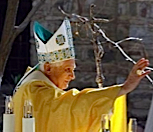 Pope Says Mass in One of Turkey's Most-Revered Christian Sites, by Sabina Castelfranco. Voice of Americas 11/29/06:
Pope Says Mass in One of Turkey's Most-Revered Christian Sites, by Sabina Castelfranco. Voice of Americas 11/29/06:Many had gathered at the restored stone "House of Mary" sanctuary in the morning, waiting for the pope to arrive. They waved palm leaves and Turkish flags and sang hymns.
The pope appeared in good spirits. He smiled at the crowd that clapped and shouted out his name. In his homily, the pontiff prayed for peace in the world and, in particular, in the Holy Land. . . .
Benedict is the third pope to make the pilgrimage to the "House of Mary." Paul VI visited in 1967 and John Paul II came here in 1979.
Every year, tens of thousands of Christians and Muslims visit the "House of Mary" where, according to legend, the mother of Jesus lived the last years of her life. It is here that Saint John the Apostle is believed to have brought the Virgin Mary to care for her, after the death of her son, Jesus.
The site was discovered in 1891 by archeologists, who based their search on writings by the German nun, Anne Catherine Emmerich.
- Where Mary Is Believed to Have Lived Zenit News. 11/29/06. "From the first centuries, numerous Christian authors from the East and West mentioned John's and the Blessed Virgin's stay in this city, in which were located the headquarters of the first of the seven Churches mentioned in the Book of Revelation. But, how was it determined that this was the house of Jesus' Mother?"
- A Mass at the House of Mary, by Owen Matthews. Newsweek 11/29/06.
- In Ephesus, Supreme Pontiff becomes a simple country pastor, by John Allen, Jr. National Catholic Reporter 11/29/06.:
On a beautiful fall afternoon on a Turkish hillside, Pope Benedict XVI, Supreme Pontiff of the 1.1 billion-strong Roman Catholic Church, metamorphosed into a simple country pastor, celebrating an outdoor Mass for no more than 300 pilgrims – perhaps half Germans who belong to the nearby German-language parish of St. Nicholas.
It was the smallest crowd in recent memory for a papal Mass, though the turnout was mostly due to the remote location and the tiny size of Turkey’s Christian community. The event had an intimate feel, with the assembly physically closer to the pope than is often the case. . . .
- Pope praises priest slain in cartoon furore The Guardian Nov. 29, 2006:
Pope Benedict today honoured the memory of a Roman Catholic priest who was killed after the publication of the Danish cartoons of the prophet Muhammad.
At a small open-air mass in Ephesus, Turkey, next to the ruins of a house where the Virgin Mary is thought to have spent her last years, the Pope praised the priest to 250 invited guests.
"Let us sing joyfully, even when we're tested by difficulties and dangers, as we have learned from the fine witness given by the Roman priest John Andrea Santoro, whom I am pleased to recall in this celebration."
A Turkish teenager shot the priest as he knelt in prayer in his church in the Black Sea port of Trabzon. The February attack occurred amid widespread Muslim anger over the cartoons. Two other Catholic priests were attacked in Turkey this year.
- Papal Photos of the Mass from The Cafeteria is Closed; American Papist; American Papist with Pope Benedict in the Cathedral of St. George .
Istanbul
(Constantinople) [Wikipedia Guide]
- Moment of prayer at the Patriarchal Church of St. George and private meeting with H.H. Bartholomew I - Greeting of the Holy Father
- Schedule: Pope and Ecumenical Patriarchate meeting Spero News 11/28/06.
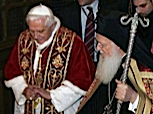 Welcome by His All Holiness Ecumenical Patriarch Bartholomew to His Holiness Pope Benedict XVI After the Prayer Service at the Patriarchal Cathedral of St. George:
Welcome by His All Holiness Ecumenical Patriarch Bartholomew to His Holiness Pope Benedict XVI After the Prayer Service at the Patriarchal Cathedral of St. George:So it is with open embrace that we welcome you on the blessed occasion of your first visit to the City, just as our predecessors, Ecumenical Patriarchs Athenagoras and Demetrios, had welcomed your predecessors, Popes Paul VI and John Paul II. These venerable men of the Church sensed the inestimable value and urgent need alike of such encounters in the process of reconciliation through a dialogue of love and truth.
Therefore, we are, both of us, as their successors and as successors to the Thrones of Rome and New Rome equally accountable for the steps - just, of course, as we are for any missteps - along the journey and in our struggle to obey the command of our Lord, that His disciples "may be one."
- Address by His Holiness Pope Benedict XVI at the Prayer service in the Church of St. George :
It gives me great joy to be among you, my brothers in Christ, in this Cathedral Church, as we pray together to the Lord and call to mind the momentous events that have sustained our commitment to work for the full unity of Catholics and Orthodox. I wish above all to recall the courageous decision to remove the memory of the anathemas of 1054. The joint declaration of Pope Paul VI and Patriarch Athenagoras, written in a spirit of rediscovered love, was solemnly read in a celebration held simultaneously in Saint Peter’s Basilica in Rome and in this Patriarchal Cathedral. The Tomos of the Patriarch was based on the Johannine profession of faith: “Ho Theós agapé estin” (1 Jn 4:9), Deus caritas est! In perfect agreement, Pope Paul VI chose to begin his own Brief with the Pauline exhortation: “Ambulate in dilectione” (Eph 5:2),“Walk in love”. It is on this foundation of mutual love that new relations between the Churches of Rome and Constantinople have developed.
- "That They May All Be One" - translation of an article, signed by Bartholomew I, ecumenical patriarch of Constantinople, which appeared on the front page of the Nov. 27-28 Italian edition of L'Osservatore Romano. [Zenit News Service. 11/29/06]
- Origins of the Ecumenical Patriarchate Spero News. 11/28/06.
Coverage & Commentary
- Benedict XVI and Bartholomew I pray in Istanbul for unity between Churches Catholic News Agency. 11/29/06.
- Pope and Patriarch offer symbolism, but don't expect breakthroughs, by John Allen, Jr. National Catholic Reporter 11/29/06.
- Benedict XVI meets Bartholomew I, together for full unity AsiaNews.It 11/29/06:
Bartholomew and Benedict already know each other and have met before, but the Pope’s visit to Istanbul, where the Pontiff will meet the Patriarch three times, is an expression of their shared desire to pursue the ecumenical journey.
Bartholomew made this point reminding popes and patriarchs of their responsibility along the path of reconciliation. Benedict XVI echoed it when explaining that his visit to the patriarchate is part of the journey to strengthen “the impetus towards mutual understanding and the quest of full unity.”
Earlier, the Pope mentioned “the momentous events that have sustained our commitment to work for the full unity of Catholics and Orthodox. I wish above all to recall the courageous decision to remove the memory of the anathemas of 1054,” taken in a joint declaration by Pope Paul VI and Patriarch Athenagoras, and “written in a spirit of rediscovered love”.
General
- Al Qaeda in Iraq, Vatican trade words on pope visit CNN 6:07pm 11/29/06 - Al Qaeda in Iraq on Wednesday denounced Pope Benedict XVI's visit to Turkey, calling it part of a "crusader campaign" against Islam. The Vatican said the comments showed the need to fight "violence in the name of God."
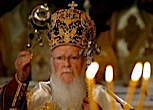 Divine Liturgy of Saint John Chrysostom in the Patriarchal Church of St. George in the Phanar on the Feast of Saint Andrew the Apostle, Patron Saint of the Church of Constantinople. [Video | Photos]
Divine Liturgy of Saint John Chrysostom in the Patriarchal Church of St. George in the Phanar on the Feast of Saint Andrew the Apostle, Patron Saint of the Church of Constantinople. [Video | Photos]
- Address of the Holy Father. 11/30/06
- Homily by His All Holiness Ecumenical Patriarch Bartholomew 11/30/06
- Common Declaration by Pope Benedict XVI and Patriarch Bartholomew I - The Ecumenical Patriarchate. 11/30/06.
- Magnificent Photos of the Divine Liturgy at the Patriarchal Church of St. George - Courtesy of Kath.Net.
Coverage / Commentary
- Homily of the Ecumenical Patriarch before Benedict [Analysis] - Fr. John Zuhlsdorf (What does Prayer Really Say?) provides some sharp analysis of Patriarch Bartholomew's homily and some thoughts of his own:
Frankly, I think liturgy is a serious issue for ecumenical dialogue with the East. Think about this. They look at the stupid things the Latins have done and are doing to the sacred liturgy, about how those desiring traditional liturgy from lay people to priests, are marginalized and berated. They see the leaders of a group of "traditionalists" are ecommunicated. And they are going to get closer to Rome? Would they hope that their traditions would be respected were they to give greater submission to the authority of Peter which the Pope of Rome exercises?
- Pope Relaunches Dialogue on Petrine Ministry: Renews Commitment to Seek Full Catholic-Orthodox Unity Zenit News. 11/30/06:
The Pope's proposal resounded today in the Cathedral of St. George at the Phanar -- the ancient Greek neighborhood of Istanbul where the Orthodox patriarchate's headquarters is located -- at the end of the Divine Liturgy on the feast of St. Andrew. The Orthodox patriarch celebrated the Divine Liturgy.
The Holy Father, who prayed the Our Father in Greek, occupied a place of honor without being able to concelebrate, given the millennium-old division between the two Churches.
Bartholomew I of Constantinople said in his homily: "We confess in sorrow that we are not yet able to celebrate the holy sacraments in unity. And we pray that the day will come when this sacramental unity will be realized in its fullness."
For his part, the Roman Pontiff explained that his "presence here today is meant to renew our commitment to advancing along the road toward the re-establishment -- by God's grace -- of full communion between the Church of Rome and the Church of Constantinople."
"I can assure you," the Pope continued, "that the Catholic Church is willing to do everything possible to overcome obstacles and to seek, together with our Orthodox brothers and sisters, ever more effective means of pastoral cooperation to this end."
- Under the Turkish Guns, the Christians Roar, by Joshua Trevino. Brussels Journal 12/1/06.
- Turkish spokesman rejects title of "Ecumenical" Patriarch Catholic World News. Dec. 1, 2006:
As a November 30 press conference in Ankara, the spokesman for Turkey's foreign-affairs ministry asked Pope Benedict XVI to refrain from using the title "Ecumenical Patriarch" in reference to the Orthodox prelate Bartholomew I of Constantinople.
The ministry spokesman, Namik Tan, explained to reporters that the term "ecumenical," implying a universal role in Church leadership. That implication would violate the principles of secularism that inform the Turkish republic, he argued.
The Turkish government spokesman made his remarks only after Pope Benedict had joined with Patriarch Bartholomew in a public celebration of the feast of St. Andrew-- the most highly publicized event of his 4-day visit in Turkey. On November 29, when he met with the Patriarch at the church of St. George in Phanar, Pope Benedict had spoken of his gratitude for the invitation extended by "the Ecumenical Patriarchate." Again on November 30, during a talk for the feast of St. Andrew, he spoke of "Ecumenical Patriarch Bartholomew I."
Visit to the Museum of Saint Sofia and the Grand Umayyad Mosque ["Blue Mosque"]
Coverage / Commentary
- Footage of Pope Benedict's visit to the Grand Umayyad Mosque (YouTube.com) - The prayer occurs starting at 6:58. ("Interestingly, Pope Benedict keeps praying long after the Mufti has finished his devotions. -- via Dale Price)
- "Built in the sixth century and in its time the largest church in the world, Hagia Sophia was turned into a mosque in the 15th century by the conquering Ottoman Turks. The Blue Mosque was deliberately sited to face Hagia Sophia to demonstrate that Ottoman and Islamic architects and builders could rival anything their Christian predecessors had created. It got its popular name because of the coloring of may of the tiles." [Source: CBSNews.com]
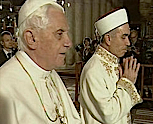 Pope joins Grand Mufti at prayer inside Blue Mosque The Times UK - Dec. 1, 2006:
Pope joins Grand Mufti at prayer inside Blue Mosque The Times UK - Dec. 1, 2006:When the two men reached the mihrab, the focal point of the mosque facing Mecca, the Mufti explained that Muslims stand for 30 seconds there “to achieve serenity”. He then announced: “I am going to pray.” The pontiff turned towards Mecca and joined him, his lips clearly moving in prayer for over a minute.
Father Federico Lombardi, the Pope’s spokesman, said that the pontiff had “paused in meditation and certainly he addressed his thoughts to God”.
However, Pope Benedict’s act of prayer differed significantly from that of Pope John Paul II, who when he visited a mosque in Damascus in 2001 was left to meditate alone. The Pope continued praying yesterday after the Mufti had stopped.
The historic gesture underlined the Pope’s wish to use his visit to reach out to Muslims outraged by his remarks on Islam at Regensburg University in September.
- In sign of respect to Muslims, pope prays in Istanbul's Blue Mosque, by John Thavis. Catholic News Service. 11/30/06:
The pope accepted the gift of a ceramic tile inscribed with the word "Allah" in the form of a dove.
Placing his hand on the tile, the pope said: "Thank you for this gift. Let us pray for brotherhood and for all humanity."
"Your Holiness, please remember us," the mufti replied. . . .
The pope asked a few questions but mostly listened during his tour. He was surrounded by a phalanx of Vatican aides and security personnel.
Before leaving, he stopped to write in the museum's guest book.
"In our diversity, we find ourselves before faith in the one God. May God enlighten us and help us find the path of love and peace," he wrote.
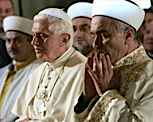 Pope Wins Praise By Praying With Mufti, by Allen Pizzey. CBS Evening News' "Reporters Notebook" 11/30/06:
Pope Wins Praise By Praying With Mufti, by Allen Pizzey. CBS Evening News' "Reporters Notebook" 11/30/06:The press then had to go through its usual round of asking each other "did-he-didn't-he," agree that he did — and then wait for confirmation from the Vatican spokesman, who more or less confirmed that the pope had indeed prayed, in a manner of speaking.
Turkish TV, which carried the event live, had no doubts — and was almost universally breathless in its coverage. "We are shocked ... it is fabulous … fantastic ... they pray together ... pope and mufti pray together ... historical ..." were among the comments.
They even noted that the Pope had, like everyone else, taken off his shoes, as is required in a mosque. But not for him the feel of soft, rich carpet under his socks. Benedict appeared to be wearing white slippers.
- Peter Visits Andrew – And Prays at the Blue Mosque, by Sandro Magister. www.Chiesa December 1, 2006:
On the feast of saint Andrew, Benedict XVI entered the Blue Mosque in Istanbul with the cross of Jesus clearly visible upon his chest. He paused before the mihrab facing Mecca, and prayed in silence beside the grand mufti, who murmured the opening words of the Qur’an: all this took place with the freedom and clarity marked out by his lecture in Regensburg.
But a no less symbolic gesture took place shortly before this, with the pope’s entrance into the Hagia Sophia, now a museum, previously a mosque, and before that the cathedral church of the patriarch of Constantinople, in the land where early Christianity flourished.
In the Hagia Sophia, Benedict XVI did not immerse himself in prayer; he did not repeat the gesture of Paul VI when he visited there in 1967. Surrounded and hemmed in at every moment, he was able only to admire – in the impressive architecture of the Hagia Sophia, in its Byzantine mosaics, and in its Qur’anic inscriptions – the magnificent and sorrowful image encapsulating the Christian East of yesterday and today. First there was Greek civilization and then early Christianity, then Roman culture and then the Islam that conquered but did not erase what came before it, and finally the little flock surrounded by wolves that keeps the Christian faith alive in today’s Turkey.
- Papal Pause Not Exactly a Prayer, Zenit News Service. 11/30/06:
Jesuit Father Federico Lombardi, director of the Vatican press office, confirmed, after the Holy Father's historic visit today, that "the Pope paused in a moment of meditation and recollection."
"It was a moment of personal meditation, of relationship with God, which can also be called of personal, profound prayer," Father Lombardi told journalists, "but it was not a prayer with external manifestations characteristic of the Christian faith."
- "His Lips Moved", by Robert Moynihan. Inside the Vatican 11/30/06:
Benedict’s moving lips were captured by television cameras and transmitted by satellite instantaneously around the world, to the ends of the earth.
Perhaps the Pope was not really "praying" at all? Perhaps he was just "meditating"? Was this possible?
No, because when the two men continued on their way (as Serena, who was there and could hear everything, related to me), the pope said to the mufti, "Thank you for this moment of prayer." There seems no doubt, then, that Benedict was indeed praying.
The Pope’s spokesman, Jesuit Father Federico Lombardi, was asked about this later by journalists. Was it really a prayer?
At first Lombardi seemed to hesitate, saying "the pope paused in meditation, and certainly he turned his thoughts to God."
Then he said that this could be called a moment of personal prayer, but one which did not include any of the exterior signs of Christian prayer, like a sign of the cross. In this way, Lombardi said, the pope underlined what unites Christians and Muslims, rather than any differences.
"In this sense it was a personal, intimate prayer to God," Father Lombardi said, which "can easily be expressed with his mind and with his thoughts also in a mosque, where many people cultivate the same spiritual attitude."
The essence of this argument would seem to be that the pope - or any Christian - may pray to God anywhere, not just in a Christian church, but even outdoors, even in a prison cell, even in a non- Christian place of worship, like a mosque.
* * * Personal observation on the Papal "Prayer" at the Blue Mosque:I believe this will be a moment strongly reminiscent of Pope John Paul II's Infamous Koran Kissing Incident -- which is to say, interpreted and exaggerated far beyond the Holy Father's personal intentions (taking a moment to reflect, in much the same manner as John Paul II was expressing a customary sign of respect towards the giver in that country). It will be, if not already, lambasted by 'radtrads' and exploited as a publicity stunt by the Muslim press.
Is this a "diplomatic error" on Benedict's part? -- the gesture is certainly too open to exploitation. (The same could be said for the Turkish newspaper Zaman's headline: "Pope Agrees Islam is Religion of Peace" -- of course the Pope would beg to differ, but the media will go where they will and say what they want to say regardless).
But however one chooses to receive the above, it would have to be weighed against other factors -- for instance, explicitly praising a priest slain in the Islamic rage over the Danish cartoons, or alluding to the Armenian genocide by Turkey in his address with patriarch Mesrob II.
Perhaps he could have been more explicit in attributing Turkey's responsibility for the genocide in the latter -- but then again, as a guest of Turkey, he would also have jeopardized the possibility of a return visit, in light of advancing ecumenical relations with the Orthodox, so perhaps this was a reason for a more nuanced allusion to "truly tragic conditions, like those experienced in the past century.").
Regardless, -- just as I can't interpret JPII's "kissing of the Koran" in isolation from everything else, I'm inclined to weigh this saying / action by Pope Benedict in context with everything else that was said or done during the trip. At best I think it could be construed as a blunder (we'll see to what extent the Muslim press plays this up).
In the discussion of this event at Domenico Bettinelli's -- Fr. Martin Fox stressed the importance of looking at the event "through the right lenses" ("Triumph or Capitulation"?):
Seems to me this is an event that acquires most of its meaning from the lens through which one views it.
If you view it through a fearful/defensive/paranoid lens (surf the blogosphere, you’ll find plenty of examples), it is capitulation, “political correctness,” fake nicey-nice, syncretism, etc.
If you view it through the lens of confident trust in the Holy Spirit and in the ability of our very able pope, it is considered, deliberate, courteous, astute.
If you view it through the lens of ultimate triumph, it is victorious, prophetic.
If the latter is less clear, consider—wasn’t there a question some time back about an Imam visiting a Christian cathedral, and how awful that was? Well, which is it: is a leader of a religion coming to the turf of another a sign of strength or of weakness?
Seems to me the very fact a priest entered a mosque represents an invasion of Christian sanctity-— Christ himself has entered, in persona Christi capitis; in fact, not merely a priest, but a bishop, a successor to the Apostles; and not any successor, but Peter’s successor!
Now, some won’t be happy unless he came tossing holy water around and making the sign of the cross. But I would say the pope’s very person-- as bishop and as successor to Peter-- is vastly more significant in bringing Christ into that mosque.
Of course the Muslim triumphalists think they’ve won something, but they believe in Islamic eschatology, whereas we know the truth. Why should we see things through their lens.
* * * 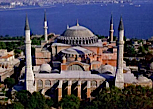 The Shell of a Great Church, by Joshua Trevino. Brussels Journal 11/29/06. - "The Hagia Sophia is a tragedy in being."
The Shell of a Great Church, by Joshua Trevino. Brussels Journal 11/29/06. - "The Hagia Sophia is a tragedy in being."When the Turk's hired Christian engineer sapped the Theodosian walls to claim the Queen City for Islam, the tale is that Mehmet the Conquerer spent days exploring the recesses of the Hagia Sophia. It was the great prize of the great city -- and when the Sultan emerged, he pronounced himself well pleased. He had the Great Church stripped of its nine hundred years of decoration -- glorious gilt and mosaics -- and caused minarets to be built at its corners. Hagia Sophia was now a mosque. Its Muslim occupants did not bother to rename it: instead, its Greek name became its Turkish one as well -- Ayasofya, a word meaning nothing in Turkish beyond the unintended invocation of the Holy Wisdom. Throughout the Ottoman period, the Christians of the east yearned for a Liturgy to be sounded again in the Hagia Sophia. At the end of that period, it seemed as if it might come to pass: one of the demands of the European powers, prior to the recognition of Ataturk's republic, was that the Hagia Sophia again be a church. Ataturk would not hear of it -- but he did make it a museum, and that was sufficient for the powers of Europe.
- Pope visits Blue Mosque as gesture of outreach to Muslims, by John Allen, Jr. National Catholic Reporter 11/30/06.
Moment of prayer in the Armenian Apostolic Cathedral and meeting with H.B. Patriarch Mesrob II
- Greeting of the Holy Father Benedict XVI to Patriarch Mesrob II Armenian Apostolic Cathedral, Istanbul. 11/30/06.
Coverage / Commentary
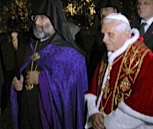 Pope and Armenian Seek to Surmount Schism, Zenit News Service 11/30/06:
Pope and Armenian Seek to Surmount Schism, Zenit News Service 11/30/06:During the celebration of the Word, following [Patriarch Mesrob II Mutafina]'s address, Benedict XVI clarified that "Our meeting is more than a simple gesture of ecumenical courtesy and friendship."
"It is a sign of our shared hope in God's promises and our desire to see fulfilled the prayer that Jesus offered for his disciples on the eve of his suffering and death: 'That they may all be one. As you, Father, are in me and I in you, may they also be one in us, so that the world may believe that you have sent me,'" the Pope said, quoting from John 17:21.
"We must continue therefore to do everything possible to heal the wounds of separation and to hasten the work of rebuilding Christian unity," the Holy Father continued. "May we be guided in this urgent task by the light and strength of the Holy Spirit."
- Pope Recalls Armenian Genocide Catholic World News. 11/30/06:
In his greeting to the patriarch, the Holy Father praised the Armenian people for their faithful witness to the Gospel, even under "truly tragic conditions, like those experienced in the past century." He was clearly alluding to the slaughter of Armenians under the Ottoman empire.
To this day the Turkish government refuses to acknowledge the genocidal campaign of 1915- 1917, in which an estimated 1.5 million Armenians were killed during massacres and forced marches, as the government of the "Young Turks" forced the relocation of an entire people. The Armenian Apostolic Church remains the largest Christian community in Turkey, but today numbers only about 50,000 faithful; in the late 19th century the number was several million. There are about 2 million members of the Church living in the country now known as Armenia.
- Holy Father says meeting with Armenian patriarch a sign of hope for Christian unity Catholic News Agency. Dec. 1, 2006.
- With Turkey's Armenians, Benedict shows off his 'great ear', by John Allen, Jr. National Catholic Reporter 12/03/06:
Though Benedict indeed spared no effort to send positive signals to the Turks, his more immediate sensitivity in his meeting with the Armenians was actually for someone else – the Armenians themselves, and especially their leader, Patriarch Mesrob II.
“It would have been a huge headache for us,” Mesrob II told NCR in Istanbul shortly after his meeting with the pope, referring to the prospect of Benedict XVI inflaming Turkish sentiment by using the term “genocide.”
Mesrob said doing so would have thrown his community of perhaps 60,000, the largest Christian community in Turkey but still a tiny minority in a nation of some 72 million, into tumult, potentially making them targets for a nationalist backlash.
Benedict XVI could have gone home after setting off such a rhetorical bomb, Mesrob II suggested, but the Armenians would have been left behind to deal with the aftermath.
- Interview with Patriarch Mesrob II of Istanbul and Turkey Pt. I; Pt. II, by Florence Avakian. Circa 1999.
Additional Visits
- Meeting with H.E. the Syrian Orthodox Metropolitan
- Meeting with the Grand Rabbi of Turkey:
The Hebrew term for "wise man" Haham has been adopted in Turkish to mean "Rabbi." This is to avoid the use of the word "Rabbi" since in Arabic the word "Rab" is one of he names of God and may not be applied to a human.
See Also: History of the Jews in Turkey [Wikipedia Entry]Still today the Grand Rabbi is called the "Hahambasi." (Head of Rabbis)." [Source]
- Meeting and dinner with the members of the Catholic Episcopal Conference
Friday, 1 December
- Holy Mass at the Cathedral of the Holy Spirit - Homily of the Holy Father
- Farewell ceremony at the Airport of Istanbul
- 13.15 Departure from the Airport of Istanbul to Rome
Coverage / Commentary
- Pope encourages Turkish Christians to live in harmony with Muslims, by John Thavis. Catholic News Service. 11/01/06.
- Pope says Church in Turkey asks to live with the freedom to reveal Christ Catholic News Agency. 12/01/06:
On the last day of his Apostolic voyage to Turkey, Pope Benedict XVI celebrated Mass for the country’s Catholic community, affirming that the Church does not wish to impose its faith on anyone but, “merely asks to live in freedom,” in order to reveal Christ Jesus.
The Holy Father reminded the numerous Catholics gathered in the Cathedral of the Holy Spirit that the Church, “has been charged to proclaim (Christ’s) Gospel to the ends of the earth (cf. Mt 28:19), transmitting to the men and women of our time the Good News which not only illuminates but overturns their lives, even to the point of conquering death itself. This Good News is not just a word, but a person, Christ himself, risen and alive!”
“The Church’s mission,” he added, “is not to preserve power, or to gain wealth; her mission is to offer Christ, to give a share in Christ’s own life, man’s most precious good, which God himself gives us in his Son.”
Ciampino (Rome)
- 14.45 Arrival at the Airport of Ciampino (Rome)

No comments:
Post a Comment